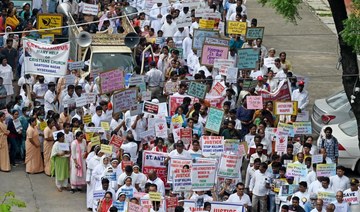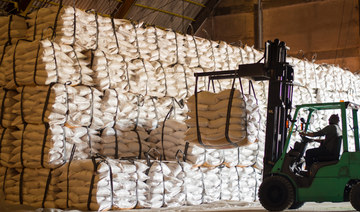NEW DELHI: Prime Minister Narendra Modi’s government has replaced the name India with a Sanskrit word in dinner invitations sent to guests attending this week’s Group of 20 summit, in a move that reflects his Hindu nationalist party’s efforts to eliminate what it sees as colonial-era names.
Indian President Droupadi Murmu is referred to as “President of Bharat” instead of “President of India” in the invitation sent to G20 attendees. The nation of more than 1.4 billion people is officially known by two names, India and Bharat, but the former is most commonly used, both domestically and internationally.
Bharat is an ancient Sanskrit word which many historians believe dates back to early Hindu texts. The word also means India in Hindi.
The change in nomenclature is backed by officials of Modi’s Bharatiya Janata Party. They argue that the name India was introduced by British colonials and is a “symbol of slavery.” The British ruled India for about 200 years until the country gained independence in 1947.
“Another blow to slavery mentality,” the top elected official of Uttarakhand state, Pushkar Singh Dhami, said on X, formerly known as Twitter. Dhami, who is a leader of Modi’s governing party, shared the dinner invitation sent to G20 guests in his post.
Modi’s party has long tried to erase names related to India’s Mughal and colonial past.
In 2015, New Delhi’s famous Aurangzeb Road, named after a Mughal king, was changed to Dr. APJ Abdul Kalam Road after protests from Modi’s party leaders. Last year, the government also renamed a colonial-era avenue in the heart of New Delhi that is used for ceremonial military parades.
Modi’s government says the name changes are an effort to reclaim India’s Hindu past.
India’s opposition parties, however, criticized the move.
“While there is no constitutional objection to calling India “Bharat,” which is one of the country’s two official names, I hope the government will not be so foolish as to completely dispense with “India,” which has incalculable brand value built up over centuries,” opposition lawmaker Shashi Tharoor said on X.
Tharoor said Indians should “continue to use both words rather than relinquish our claim to a name redolent of history, a name that is recognized around the world.”
Disputes over “India” versus “Bharat” have gained ground since opposition parties in July announced a new alliance — called INDIA — to unseat Modi and defeat his party ahead of national elections in 2024. The acronym stands for Indian National Developmental Inclusive Alliance.
Since then, some officials in Modi’s party have demanded that the country be called Bharat instead of India.
India’s government replaces ‘India’ with ancient name ‘Bharat’ in dinner invitation to G20 guests
https://arab.news/jbh9j
India’s government replaces ‘India’ with ancient name ‘Bharat’ in dinner invitation to G20 guests

- Bharat is an ancient Sanskrit word which many historians believe dates back to early Hindu texts
- Modi’s government says the name changes are an effort to reclaim India’s Hindu past
Businesswoman set to become Iceland’s next president

- Halla Tomasdottir was officially credited with 34.6% of votes, after 71.6% of ballot papers had been counted
- Iceland’s president holds a largely ceremonial position in the parliamentary republic
Jakobsdottir conceded defeat early on Sunday and congratulated Tomasdottir, the CEO of The B Team, a global non-profit co-founded by UK business tycoon Richard Branson to promote business practices focused on humanity and the climate.
Iceland’s president holds a largely ceremonial position in the parliamentary republic, acting as a guarantor of the constitution and national unity.
He or she does however have the power to veto legislation or submit it to a referendum.
Tomasdottir, 55, was officially credited with 34.6 percent of votes, after 71.6 percent of ballot papers had been counted on Sunday.
The 48-year-old Jakobsdottir, who stepped down as prime minister of a left-right government in April to run in Saturday’s election, garnered 25 percent.
The results showed Tomasdottir with much stronger support than opinion polls had suggested in the run-up to the election, where the two candidates had been seen running neck-and-neck.
The final results were likely to change somewhat but Jakobsdottir conceded defeat in the early hours of Sunday before the last votes were in.
“It seems to me that Halla Tomasdottir is quickly heading toward becoming the next president of Iceland.
“I congratulate her on that and know that she will be a good president,” Jakobsdottir told national broadcaster RUV at an election night rally.
Tomasdottir meanwhile told daily Morgunbladid during her election rally she was “just trying to breathe.”
“I feel incredibly good. I know it’s not over until it’s over. So I’m also just trying to stay calm and breathe,” she said.
Tomasdottir is also the founder of Audur Capital, an investment firm created in 2007 aimed at promoting feminine values in the financial sector.
No one central issue dominated the campaign, where candidates traditionally run as independents without party affiliations.
In the country of 380,000 people, any citizen gathering 1,500 signatures can run for office.
While Jakobsdottir was at times seen as the favorite, political observers had suggested that her background as prime minister could weigh against her.
Among the other main candidates in the field of 13 were a political science professor, a comedian, and an Arctic and energy scholar.
Tomasdottir is set to be the second woman to serve as Iceland’s president.
In 1980, Vigdis Finnbogadottir became the world’s first woman democratically elected as head of state.
The businesswoman is set to succeed the hugely popular Gudni Johannesson, who has held the job since 2016.
He announced earlier this year that he would not seek re-election.
Jakobsdottir, party leader for the Left Green Movement from 2013 until her presidential bid, has been hailed for her handling of the resurgence in volcanic eruptions on the Reykjanes peninsula since December.
The five eruptions, including one last week, have sparked a series of evacuations as well as the state’s acquisition of homes from residents evacuated from the threatened fishing town of Grindavik.
Rescue crews work to free people trapped under a collapsed apartment building in Istanbul

ISTANBUL: Emergency workers were trying to rescue people trapped under a collapsed apartment building in Istanbul on Sunday.
TV images showed firefighters shifting rubble by hand from the flattened three-story building in Kucukcekmece on the city’s European side. Two injured people were pulled from the debris, broadcaster CNN Turk reported.
The Istanbul governor’s office said the structure collapsed at 8:40 a.m. local time (0545 GMT). The cause was not immediately clear.
More than 59,000 people were killed last year when a magnitude 7.8 earthquake struck parts of southern Turkiye and neighboring Syria. The disaster highlighted the poor enforcement of building regulations in Turkiye.
Heatstroke killed 33 Indian polling staff on last voting day— state election chief

- Security guards, sanitation staff included among 33 Indian polling staff who died from heat
- Indian PM Modi expected to win third successive landslide election after results are announced
Lucknow, INDIA: At least 33 Indian polling staff died on the last day of voting from heatstroke in just one state, a top election official said Sunday, after scorching temperatures gripped swathes of the country.
While there have been reports of multiple deaths from the intense heatwave — with temperatures above 45 degrees Celsius (113 degrees Fahrenheit) in many places — the dozens of staff dying in one day marks an especially grim toll.
The India Meteorological Department (IMD) said temperatures at Jhansi in Uttar Pradesh reached 46.9 degrees Celsius (116 Fahrenheit).
Navdeep Rinwa, chief electoral officer for the northern state of Uttar Pradesh, where voting in the seventh and final stage of elections ended Saturday, said 33 polling personnel died due to the heat.
The figure included security guards and sanitation staff.
“A monetary compensation of 1.5 million rupees ($18,000) will be provided to the families of the deceased,” Rinwa told reporters.
Experts say that when a person is dehydrated, extreme heat exposure thickens their blood and causes organs to shut down.
Rinwa reported a separate incident in which a man queueing to vote in the city of Ballia lost consciousness while waiting in line.
“The voter was transported to a health facility, where he was pronounced dead upon arrival,” Rinwa said.
India is no stranger to searing summer temperatures.
But years of scientific research have found climate change is causing heatwaves to become longer, more frequent and more intense.
Hindu-nationalist Prime Minister Narendra Modi looks set to win a third straight landslide election victory after voting ended on Saturday.
Exit polls showed he was well on track to triumph and Modi himself was certain he had prevailed.
The results will be formally announced on Tuesday.
Heatstroke kills 33 Indian polling staff on last voting day: state election chief

- Navdeep Rinwa, chief electoral officer for the northern state of Uttar Pradesh, where voting in the seventh and final stage of elections ended Saturday, said 33 polling personnel died due to the heat
LUCKNOW: At least 33 Indian polling staff died on the last day of voting from heatstroke in just one state, a top election official said Sunday, after scorching temperatures gripped swathes of the country.
While there have been reports of multiple deaths from the intense heatwave — with temperatures above 45 degrees Celsius (113 degrees Fahrenheit) in many places — the dozens of staff dying in one day marks an especially grim toll.
The India Meteorological Department (IMD) said temperatures at Jhansi in Uttar Pradesh reached 46.9 degrees Celsius (116 Fahrenheit).
Navdeep Rinwa, chief electoral officer for the northern state of Uttar Pradesh, where voting in the seventh and final stage of elections ended Saturday, said 33 polling personnel died due to the heat.
The figure included security guards and sanitation staff.
“A monetary compensation of 1.5 million rupees ($18,000) will be provided to the families of the deceased,” Rinwa told reporters.
Experts say that when a person is dehydrated, extreme heat exposure thickens their blood and causes organs to shut down.
Rinwa reported a separate incident in which a man queueing to vote in the city of Ballia lost consciousness while waiting in line.
“The voter was transported to a health facility, where he was pronounced dead upon arrival,” Rinwa said.
India is no stranger to searing summer temperatures.
But years of scientific research have found climate change is causing heatwaves to become longer, more frequent and more intense.
Hindu-nationalist Prime Minister Narendra Modi looks set to win a third straight landslide election victory after voting ended on Saturday.
Exit polls showed he was well on track to triumph and Modi himself was certain he had prevailed.
The results will be formally announced on Tuesday.
China says it saw armed Philippine personnel on vessel in disputed South China Sea

- A 29-second video appeared to show a masked man momentarily holding up a blurred black object that resembled a rifle
BEIJING: Chinese state media said on Sunday that personnel on a Philippine ship pointed guns at China’s Coast Guard in disputed waters of the South China Sea last month.
At least two personnel on the Philippine vessel near the Second Thomas Shoal were carrying guns on deck, pointing them in the direction of China’s Coast Guard, CCTV said in a social media post.
An accompanying 29-second video appeared to show a masked man momentarily holding up a blurred black object that resembled a rifle.
China claims almost the entire South China Sea, a conduit for more than $3 trillion of annual ship-borne commerce, including parts claimed by the Philippines, Vietnam, Indonesia, Malaysia and Brunei. The Permanent Court of Arbitration in 2016 said China’s claims had no legal basis.
CCTV said the alleged incident occurred during a Philippine mission to supply troops. The troops are stationed on a rusting warship that Manila grounded in 1999 to reinforce its sovereignty claims.
The Philippine navy, coast guard and National Security Council, as well as the country’s embassy in Beijing did not immediately respond to requests for comment.
Philippine President Ferdinand Marcos Jr, in a speech on Friday attended by China’s defense minister, made a thinly veiled reference to Beijing, denouncing what he called illegal, coercive and aggressive actions in the South China Sea, which were undermining Southeast Asian countries’ a vision for “peace, stability and prosperity” in the sea.
Confrontations between the Philippines and China in the South China Sea have grown more tense and frequent during the past year, including China’s Coast Guard using water cannons and accusations by Manila that it had rammed Philippine vessels.


















